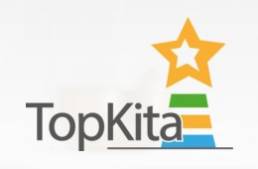rainbowtrekkers Widdersdorf
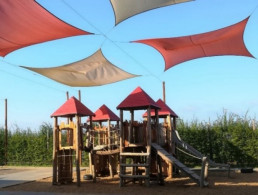
1. Structure
1.1 Location and contact details
The kindergarten in Widdersdorf, which was opened in November 2016, is centrally located in the newly developed residential area Widdersdorf-Süd.
1.2 Number of places and age groups
In Widdersdorf there are 80 places for children aged 1-6 years.
1.3 Opening and closing times
Our regular opening times are from Monday to Friday from 7.30 a.m. to 4.30 p.m. Caregiving contracts cover 45 hours a week.
The kindergarten is closed 27 days a year. The closing times will be announced ahead of time before the start of the kindergarten year.
1.4 Admission criteria
The demand is greater than the available places. Therefore, we decide on the allocation of places – transparent for all parents – according to the following criteria (in descending order of importance):
- Siblings of the child already visit the receiving institution.
- The child fits into the receiving group in terms of age.
- Once the child has been admitted, the group will have a balanced gender mix.
- The parents share the values and educational concept of the institution and declare their willingness to enter into an educational partnership.
- Admission of the child contributes to the social and cultural balance of the group.
- The family is new and without a family support network.
2. Spaces
2.1 Indoors
In Widdersdorf, we have an interior space of almost 1,000 square metres, which is spread over two floors. The equipment on the ground floor is primarily designed to meet the needs of under-three-year-old children, while the equipment on the upper floor is geared to the abilities and interests of three- to six-year-olds. While the offices, storage and business rooms on both floors face the street, all group rooms open directly onto the outdoor area and garden.
The interior design by our pedagogical professionals aims to create an appropriate balance between free play and educational activities.
The institution consists of five groups: the Caterpillars and Butterflies (for one to three-year olds) and the Giraffes and Gummibaers for three to five-year-olds and the Smarties for five to six-year-olds.
For the younger children, the spatial aspect of security and orientation is central. The spatial concept for this age group is therefore group related. For each group there is a main room for communal activities, an adjoining room for differentiated work and a bedroom. Each group has its own sanitary and nappy-changing area.
For older children, our room program is based on diversity and variety and provides plenty of stimulation for children’s curiosity and urge for discovery. Here too, each group has its own sanitary area. In addition, certain rooms are also thematically designed.
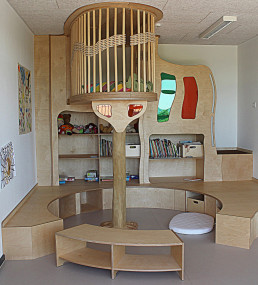
2.2 Outdoors
The outdoor area offers space for physical challenge and community activities as well as rest and retreat areas. There is a nature-oriented area with a mud hole, maze, raised flower beds, lawns, fruit trees, reeds and willow tepee.
There is also a large climbing frame, a small playhouse, sand pits, swings and a football area. The paved areas are also suitable for bobby cars and bicycles.
3. Materials
The age-appropriate educational materials offer the children of all five groups exciting and varied play opportunities. The majority of these play opportunities are freely accessible to the children to enable them to play independently. The regular turnover of the materials provides the children with new learning stimuli again and again.
Through play, children have the opportunity to let their creativity run free, to explore the environment and to actively engage with it. The children gain new experiences and make new social contacts. This effect is especially achieved by the free play of the children and is encouraged and supported by the pedagogical professionals.
Some materials can only be found in the designated functional spaces, such as various instruments in the music room and movement material in the multi-purpose room.
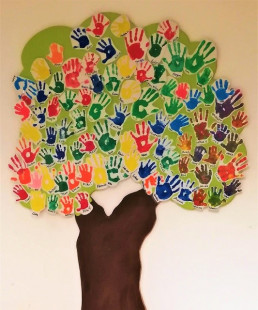
For example, there is a role-play room, a library and a studio, which are used by all groups for part of the day (“partially open”). For the older children, there is also a children’s restaurant on the upper floor, which is open to all groups.
4. Activities
In Widdersdorf we follow the pedagogical approach of the partially open concept. For us, this means that we are in the process of opening up to all sides. At the moment, we work with core groups that allow the children to move within a rather closed system at certain times and to open the doors at certain times. Opening the doors means for the children to get to know and explore their facility with all rooms across the groups. Throughout the day, activities and projects are offered that are adapted to the children’s needs, situations, and individual stage of development.
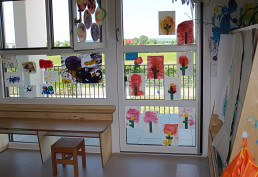
4.1 Pedagogical work
Based on the children’s interests and on event-related educational situations and circumstances, the pedagogical professionals work closely in teams to develop topics for the children that can be integrated into the annual cycle and that are based on the existing curriculum.
In this way, we ensure that the children can engage with different traditional, cultural and social topics over the course of a year. This exploration of topics also includes various projects that are offered over a longer period of time, e.g. music, sports or forest projects.
Pedagogical content is developed in close cooperation between the pedagogical staff, facility managers and the day-care provider, and ongoing processes are jointly reflected upon and adjusted as needed.
4.2 Daily routine
The daily routine in Widdersdorf offers the children structure and security. The times can vary slightly depending on the groups. The same applies on days when special activities take place (excursions, projects, etc.).
In order not to interrupt the daily routine of the morning circle, we ask all parents to bring their children to the kindergarten by 9.00 am.
| Time | Program |
|---|---|
| 07.30 | Opening of the kindergarten |
| 07.30 – 09.15 | Breakfast/ Arrival/ Home groups |
| 09.00 – 09.45 | Morning circle (entrance door locked) |
| 10.00 – 11.30 | Free play /pedagogical activities (across groups for the older children) |
| 11.30 – 13.00 | Lunchtime |
| 13.00 – 15.00 | Quiet time/ Sleep time in the home groups Free play/ pedagogical activities in the home groups Freispiel/pädagogische Angebote in den Stammgruppen |
| 15.00 – 16.00 | Snack + Activities in the home groups |
| 16.00 – 16.30 | Open work across groups |
| 16.30 | Closing of the kindergarten |
4.3 Language
Language teaching is immersive and follows the principles of translanguaging.
Detailed information on the cognitive principles and practical application can be found in our language concept.
4.4 Inclusion
Our kindergarten works based on the principles on inclusion. The institution is wheelchair accessible.
4.5 Nutrition
Our kindergarten is catered by a local catering company, which prepares lunch fresh and delivers it warm every day. The meal plan, which changes weekly, is put together and balanced in a child-oriented way. Breakfast and healthy snacks for between meals are provided by the pedagogical professionals.
The menu at rainbowtrekkers is vegetarian. In the selection of food and the composition of our meals, the caterer follows the recommendations of the German Society for Nutrition (Deutsche Gesellschaft für Ernährung).
5. Participation and self-advocacy
5.1 Participation
Everyday pedagogical life in Widdersdorf is designed with participation in mind. The children are involved in the daily decision-making processes by the professional staff. Both the design of the rooms and the pedagogical offer are carried out while taking the interests and needs of the children into account.
Further information on the topic of participation in the day-care center can be found in our framework concept.
5.2 Self-advocacy
There is a children’s parliament in our center.
Together with the children and the staff we work to develop “rules of procedure” that define the rights and duties of the “parliamentarians”.
6. Transitions
Transitions are a challenging developmental task for children, which we sensitively structure and individually support in our kindergarten.
At the beginning of the kindergarten period there is always a settling-in phase, which is based on our settling-in concept.
After one or two years in the Caterpillars or Butterflies group, there is a change to the Giraffes or Gummibaers group. In the last Kita year before the start of school there is a change to the Smarties group. These internal transitions are gently designed and individually planned and prepared by the pedagogical professionals.
Because the institution is run on a partially open-plan basis, a child who is moving to a new group is usually already familiar with a large proportion of the employees and other children in the new group from cross-group activities in the building or outside, which further facilitates the internal transition.
6.1 Pre-school support
We describe in detail in our Preschool Concept what our special offer for the preschool children in the Turtles, Giraffes or Tigers group looks like.
7. Cooperation
In accordance with our bilingual approach, we maintain cooperation with both a German-speaking and a multilingual primary school in the area.
In the German-speaking field, we cooperate with the Olympia-Schule Widdersdorf (Municipal Community Primary School, open all day). This exchange serves to prepare the children for their upcoming school enrolment. At the end of the kindergarten year, we say goodbye to the pre-school children with a special ritual and the parents are given all the documentation (portfolio, documentation of developmental talks and language development).
In the English-speaking field we cooperate with the Internationale Friedenschule, which is also located in Widdersdorf.
In the case of our focus on inclusion, we often work with different practitioners. There is a cooperation with the University Rehabilitation (“Reha”) and the Sigle Practice. Both are located directly opposite our institution. This geographical proximity gives us the advantage of being able to help children who need special support, with physiotherapy, occupational therapy and speech therapy etc.
Rainbowtrekkers are also part of the “Widdersdorfer Bildungsmeile” (Education Mile), which takes place once a year.
Meet the principal: Samuel Armstrong
My name is Sam Armstrong and I am the leader here in Widdersdorf. I was born in Ireland, but spent most of my life in the United States. I hold a degree in both Early Childhood Education and Business Management.
My background in education is quite diverse having spent many years both playing and coaching tennis professionally as well as teaching kindergarten in the U.S.A. I am a strong believer in learning through exploration and play, and I hope to implement this into our daily life at the kita.
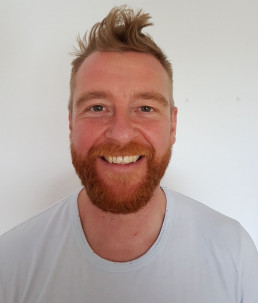
Meet the deputy: Carolin Roßbach
Mein Name ist Carolin Roßbach und ich bin die stellvertretende Kitaleitung in Widdersdorf.
Bereits nach meinem Abitur habe ich meine ersten Erfahrungen im Umgang mit Kindern gemacht. Über einen längeren Zeitraum habe ich im Ausland im Bereich Soziales und insbesondere unmittelbar mit Kindern gearbeitet.
Im Anschluss an mein erfolgreich abgeschlossenes Studium im Bereich Soziale Arbeit konnte ich sowohl meine praktischen Erfahrungen als auch theoretischen Kenntnisse über fünf Jahre als Gruppenleitung in einer Kita festigen und ausbauen.
Besonders wichtig ist mir ein respektvoller und wertschätzender Umgang auf Augenhöhe. Ich freue mich, die Kinder und das Team auf ihrem Weg begleiten zu dürfen.
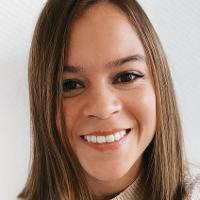
rainbowtrekkers Widdersdorf
Principal: Samuel Armstrong
Deputy: Carolin Roßbach
Unter Linden / Auf der Vierzig 2
50859 Köln (Cologne), Germany
Tel.: +49-221-650 324 27
samuel.armstrong[at]rainbowtrekkers.de
Members of:




